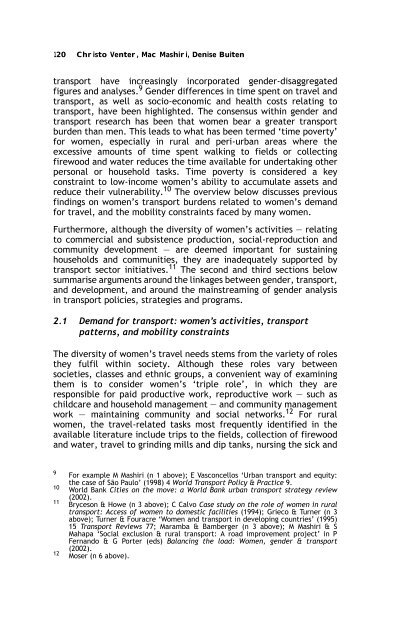Sex, Gender, Becoming - PULP
Sex, Gender, Becoming - PULP
Sex, Gender, Becoming - PULP
You also want an ePaper? Increase the reach of your titles
YUMPU automatically turns print PDFs into web optimized ePapers that Google loves.
120 Christo Venter, Mac Mashiri, Denise Buiten<br />
transport have increasingly incorporated gender-disaggregated<br />
figures and analyses. 9 <strong>Gender</strong> differences in time spent on travel and<br />
transport, as well as socio-economic and health costs relating to<br />
transport, have been highlighted. The consensus within gender and<br />
transport research has been that women bear a greater transport<br />
burden than men. This leads to what has been termed ‘time poverty’<br />
for women, especially in rural and peri-urban areas where the<br />
excessive amounts of time spent walking to fields or collecting<br />
firewood and water reduces the time available for undertaking other<br />
personal or household tasks. Time poverty is considered a key<br />
constraint to low-income women’s ability to accumulate assets and<br />
reduce their vulnerability. 10 The overview below discusses previous<br />
findings on women’s transport burdens related to women’s demand<br />
for travel, and the mobility constraints faced by many women.<br />
Furthermore, although the diversity of women’s activities — relating<br />
to commercial and subsistence production, social-reproduction and<br />
community development — are deemed important for sustaining<br />
households and communities, they are inadequately supported by<br />
transport sector initiatives. 11 The second and third sections below<br />
summarise arguments around the linkages between gender, transport,<br />
and development, and around the mainstreaming of gender analysis<br />
in transport policies, strategies and programs.<br />
2.1 Demand for transport: women’s activities, transport<br />
patterns, and mobility constraints<br />
The diversity of women’s travel needs stems from the variety of roles<br />
they fulfil within society. Although these roles vary between<br />
societies, classes and ethnic groups, a convenient way of examining<br />
them is to consider women’s ‘triple role’, in which they are<br />
responsible for paid productive work, reproductive work — such as<br />
childcare and household management — and community management<br />
work — maintaining community and social networks. 12 For rural<br />
women, the travel-related tasks most frequently identified in the<br />
available literature include trips to the fields, collection of firewood<br />
and water, travel to grinding mills and dip tanks, nursing the sick and<br />
9 For example M Mashiri (n 1 above); E Vasconcellos ‘Urban transport and equity:<br />
the case of São Paulo’ (1998) 4 World Transport Policy & Practice 9.<br />
10 World Bank Cities on the move: a World Bank urban transport strategy review<br />
(2002).<br />
11<br />
Bryceson & Howe (n 3 above); C Calvo Case study on the role of women in rural<br />
transport: Access of women to domestic facilities (1994); Grieco & Turner (n 3<br />
above); Turner & Fouracre ‘Women and transport in developing countries’ (1995)<br />
15 Transport Reviews 77; Maramba & Bamberger (n 3 above); M Mashiri & S<br />
Mahapa ‘Social exclusion & rural transport: A road improvement project’ in P<br />
Fernando & G Porter (eds) Balancing the load: Women, gender & transport<br />
(2002).<br />
12 Moser (n 6 above).
















